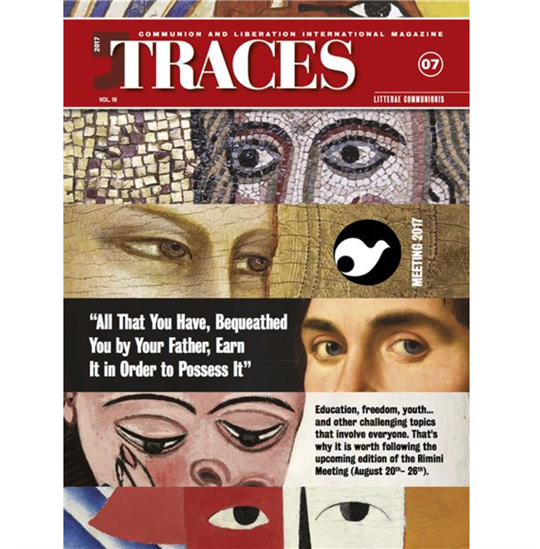
Traces N.7, July/August 2017
With Our Hands OpenThe words of Fr. Giussani that follow are always new, even if we have already heard them, because they get you where it hurts, a provocation that appears when summer comes and our lives ease up a bit from fixed commitments, obligations, and work. “The time of freedom” arrives. Fr. Giussani told the first GS students that it is “the most noble time of the year, because it is when you engage in the way you want with the value you recognize as prevalent in your life, or you don’t engage with anything at all, and then you are silly,” empty. “You understand what people want by the way they use their free time.” So then, these days are a test, because they bring out what we have most at heart. We have said this often in Traces, but in Fr. Giussani’s words there is more. If they are true – and each of us can judge how true they are – it means that the weeks ahead are also a great opportunity to understand more what freedom is. What a precious, inestimable gift is this mysterious capacity we have to adhere to the good, to ask for it, to be open to searching for it even in the details of a reality that often contains features we do not want (weariness, pain, unmet desire), or to say “no” and close in on ourselves.
We often take freedom for granted, but instead, it is the most important thing. The subtle, almost imperceptible line between accepting and rejecting becomes the touchstone for how we face circumstances and decide how we live. In front of every moment of every day, as Fr. Julián Carrón recently reminded a group of CL leaders, “there are always two conceptions at work,” the one of those who “already know,” and have their own measure in mind, an idea of how things should be (usually, different from how they are...), or “the poor person, like the Unnamed in Manzoni’s The Betrothed, so aware of his need that he is entirely open” to the words of the Cardinal. The first “puts hope in his performance, the other expects everything from Christ.”
Two attitudes, two ways of living moment by moment. But it always depends on us, on our freedom. We can stand “with our hands open or our hands closed,” as Pope Francis said to the Knights, 5,000 middle school youth, in a moving audience that we recounted in last month’s issue. We can be open to learning anew what we thought we already knew, but can instead no longer taken for granted–an attitude that will be shown at the Meeting of Rimini this year, to which the Close-Up of this issue is dedicated–or we can close in on ourselves defensively in front of this “change of epoch” and find ourselves without weapons for facing today’s challenges: education, youth, work... Open or closed. This is seen throughout this issue. It can be seen in an article by Ignacio Carbajosa commenting on the Book of Job, available at www.tracesonline.org . It is a provocative text offering many points for reflection, one of which is how God entrusts the response to the question of innocent suffering to our freedom, to the way we stand in front of Him. Open or closed. It depends on us, and it is life-changing.